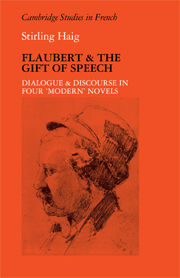4 - L'Education sentimentale
Published online by Cambridge University Press: 05 November 2011
Summary
If dialogue was defeat in Madame Bovary, its outcome is less clearly definable in L'Education sentimentale, Flaubert's masterpiece of indirection and aimlessness. The speech patterns of the characters reflect the meanderings of their existences, and the compromises they effect and accept are inscribed in their personal discourses. The absence of a “straight line” is not merely a structural plotting that brings the novel, through a vast circular movement, back to its apparent beginning. It is the to-and-fro, the ebb-and-flow of fortune and fable that leave speech in an ambiguous relationship to speakers and receivers alike. The uncertainty touches narration itself; sans doute, in L'Education sentimentale, is a phrase that repeatedly accompanies narrative explanation where there seems scarcely to be any need for doubt: “Et il s'en alia, rebuté, sans doute, par l'accueil de Frédéric” (II, 14). If the narrator, for whom the characters are customarily “transparent,” renounces all but a timid attempt to understand and convey their motives, the reader may find himself called upon to participate more actively in the exercise of understanding. Such a stance must be considered a mimetic ploy – our sense of the characters' “reality” is governed by a mechanism that could be called the opacity index: to what degree are we able to grasp the meaning and motivation of a literary character?
- Type
- Chapter
- Information
- Flaubert and the Gift of SpeechDialogue and Discourse in Four "Modern" Novels, pp. 107 - 159Publisher: Cambridge University PressPrint publication year: 1986

